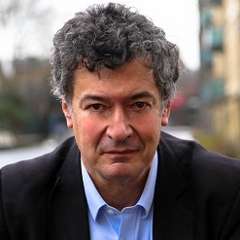There are the knowns. The things, as Rumsfeld would have it, that we know that we know. Like the way the Aurora orchestra can bring sheer youthful exuberance to a fast piece like the G Major presto finale to the symphony No.27 which ended the first half of last night's all-Mozart concert at Kings Place. Aurora don't just survive at these breakneck tempi, they absolutely thrive on them. They achieve a weightless, perfectly balanced, unanimous sound, full of astonishing energy. If lovers of classical music haven't yet heard and seen Aurora make the rosin fly, bring real edge-of-the-seat vitality to a work like this by the seventeen year old Mozart, then I can't figure what's holding you back.
The orchestra's opener, the Marriage of Figaro overture, was similarly dispatched with ease and at ferocious speed. The two arias in which they worked with that fabulously musical soprano Rosemary Joshua were also beautifully poised yet made the most of each and every shifting mood.
But what is always appealing about an Aurora concert - yes I'm a fan - is the unknowns. Nicholas Collon can be relied upon to land something completely different and unexpected into a programme, and to see the risk pay off.
Last night we had left the hall for the interval lifted by that G major presto. But when we re-entered it for the second half, we were thrust from the very first bass pedal note into a very different world. Aurora played a Mozart rarity (can such things really still exist?), the Adagio and Fuge in C minor K 546. Here the players' alertness and vitality and common purpose were put to very different ends. C minor is a dark place, a key of struggle and of foreboding. Aurora's vivid evocation of heart-rending tragedy will stay in my mind for a very long time.


